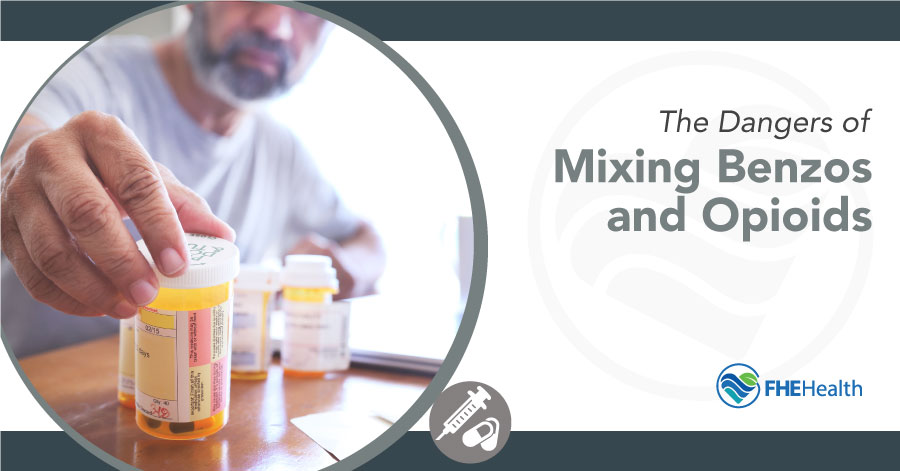
Benzos and opioids are both powerful and potentially dangerous classes of drugs, and mixing the two can create potentially dangerous situations. In some scenarios, a person might be told to mix benzos and opioids under close medical supervision, but doing so without the watchful oversight of a qualified medical physician is a high-risk undertaking. In 2019, 16% of overdose deaths relating to opioids also involved benzodiazepines. One of the challenges doctors and drug abuse charities alike are facing is that many people don’t realize how many drugs fall into the category of benzodiazepines, so they’re unaware of the risks they’re taking when mixing medications. Combining drugs such as Xanax and oxycodone may be normalized but greatly increase the risk of severe side effects, leading to lasting health issues or even death.
The Effects of Benzodiazepines
Benzodiazepines such as Xanax, Dormagane and Mogadon are used to treat anxiety, insomnia and seizures. They’re a form of depressant that works by enhancing the effect of the neurotransmitter GABA. Dosages of benzodiazepines must be carefully controlled, and even with careful dosing, side effects such as drowsiness, confusion or dizziness can occur.
Other potential side effects include:
- Memory issues
- Delirium
- Anxiety or depression
- Increased risk-taking or other behavioral changes
Benzodiazepines can be addictive, and if the withdrawal process is not properly managed, additional side effects can include seizures, tremors, fatigue, cramps, muscle pain, headaches, sleep issues, anxiety, panic attacks and feelings of confusion or unreality.
Because benzodiazepines are used for so many different conditions, and there are both long-lasting drugs and ones with a much shorter half-life, it’s not uncommon for people to fail to realize a medication they’re taking falls into this category. The risk of drug interactions is one reason it’s important to disclose any medications you’re taking when you get a new prescription or renew one, whether the other drugs are over-the-counter or prescribed ones.
The Effects of Opiates
Opioids are a form of pain relief medication. Today, opioids are prescribed only for severe pain, and for short-term use. Several drugs fall into the category of opioids, with oxycodone being one of the most well-known, but there are several others that are frequently prescribed to manage chronic or severe pain issues.
- Oxycodone (OxyContin)
- Vicodin
- Percocet
- Oxymorphone
- Morphine
- Fentanyl
Mixing Xanax and oxycodone is incredibly dangerous, as is mixing Vicodin and Xanax. By themselves, opiates are addictive and can have side effects that range from the undesirable (such as gastrointestinal issues and drowsiness) to the dangerous (respiratory suppression).
In small doses, the sedative effect of opioids can be desirable. However, higher doses can slow a person’s heart rate and make their breathing shallower. It’s this effect that can lead to accidental death through overdoses in people who’ve developed a tolerance to the pain-relieving effects of opioids.
How Benzos and Opioids Interact
When a person mixes Xanax and Percocet or any other combination of benzo and opioids, it can increase the risk of overdose dramatically. The interaction between the two drugs increases the sedative effect, which can reduce a person’s heart rate and respiration to dangerous levels.
This applies whether the drugs are used recreationally or to self-medicate and when they’re prescribed concurrently. According to one study published in the British Medical Journal, out of 2,400 veterans who died due to an overdose of opioids, 49% had been concurrently taking benzodiazepines. Preexisting medical conditions such as lung disease, liver disease or sleep apnea can increase a person’s risk of overdose when taking these medications, but this particular drug combination is a high-risk one for all patients.
Concurrent prescription of these drugs is common among people who suffer from both chronic pain and anxiety. Some of these patients take these drugs for extended periods of time, increasing the risk of tolerance (and therefore someone taking bigger doses to get the same effect). If someone is seeing more than one health care professional and getting different prescriptions from each doctor or specialist, it’s possible they may be given duplicate prescriptions or ones that might interact with each other in a dangerous way.
Why Combining Benzodiazepines and Opiates Can Be Dangerous
There are several reasons why combining benzos and opiates is risky. One common misconception is that it’s the person and their behavior that dictates overdose risk. In this instance, that’s not true. Even someone who’s following the prescribed dose of each drug can be at risk of an overdose. Having taken the medication in the past without issue is not a guarantee of future safety.
Someone who has other health conditions could be at risk, and advancing age also increases the risk of overdose or dangerous drug interactions. In addition, because people can develop a tolerance to the drugs or have side effects such as behavior changes, it’s possible for a person who previously experienced no issues with one or both drugs to encounter problems with prolonged use.
If you’ve found yourself dependent on benzos or opiates or you feel compelled to mix them as a form of self-medication, it’s important to be aware of the risk you’re taking. Engaging in this kind of high-risk behavior could be a sign of a much bigger problem. Even if you’ve successfully mixed these medications without issue in the past, that doesn’t mean it’s safe to do so in the future. Seek help from a medical professional or addiction clinic as soon as possible.
At FHE Health, we understand that the health issues and mental health conditions that can lead to a person being prescribed these classes of medication can be challenging to deal with. We run a variety of programs (benzo rehab, opioid addiction treatment) to help people deal with such challenges. If you’d like to know more about our programs, contact us online or call us at (833) 596-3502 to talk to one of our mental health practitioners who can help you start on the path to a healthier life.






